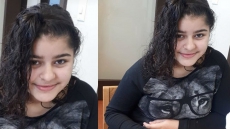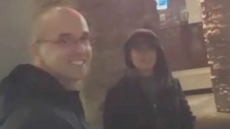COQUITLAM, B.C. — A man with schizophrenia accused of fatally stabbing a 13-year-old girl inside a high school in Abbotsford, B.C., says he's eager to face the charges against him but he still hears voices.
Gabriel Klein, 22, mumbled short answers to questions during a review board hearing Thursday at a forensic psychiatric hospital to determine his mental fitness to stand trial.
He wants a trial as soon as possible, he said, but added court is "stressful" and he has trouble concentrating because the voices are perpetually distracting him.
"I experience it every day, every hour of the day," said Klein, his eyes glassy and hair unkempt.
Klein is charged with second-degree murder in the death of the teen and aggravated assault for an attack on another girl in November 2016. The identities of the two Grade 9 students are protected by a publication ban.
A judge ruled he was unfit to stand trial in April due to his schizophrenia, auditory hallucinations and disordered thinking.
The review board was ordered to reassess his fitness in 90 days. It adjourned a hearing in July to get a second opinion on his mental state and reconvened on Thursday. After the hearing, it reserved its decision and will deliver a ruling at a later date.
Representatives of the Crown, defence and hospital all said Klein is unfit to stand trial.
Crown attorney Michaela Donnelly said she was concerned that Klein might be exaggerating his symptoms to avoid a trial. But she agreed with a psychiatrist who said he needed more treatment for his psychosis before a conclusion could be drawn about his truthfulness.
Klein told the board he has never faked any symptoms. He is not avoiding jail, he said, adding there are some "perks" to jail, such as having a TV and eating eggs and bacon on weekends.
He said he feels safer in the hospital, telling the hearing he doesn't trust jail guards, who he believes poisoned him and destroyed his memory.
"They're working for CSIS," he said, referring to the Canadian Security Intelligence Service, the national spy agency. "CSIS wants to poison me."
Psychiatrist Dr. Andrew Kolchak told the board that Klein believes he is "under the influence" of CSIS in hospital and expects its American counterpart, the Central Intelligence Agency, will "swoop him away."
He hears voices named Lucy, Lindsay and Ryan, who give him violent commands, such as attacking people in the shower or grabbing women's genitals, but he has not obeyed these commands in recent months, Kolchak said.
Klein struggled when asked about his understanding of the charges, verdicts and the roles of people in a courtroom. He said a judge's job was "to prosecute him."
Asked whether he could expect a fair trial, he said it depends on whether the pre-trial centre warden — whom Klein called the "grand wizard" — would give "fake information" to the judge.
But he said he believes he has "a good shot" at being declared NCRMD, an acronym that he admitted he doesn't understand but has heard from others in the hospital. The acronym stands for not criminally responsible due to a mental disorder, an outcome Klein's lawyer Martin Peters said he will "absolutely" seek if his client goes to trial.
Klein said he was hearing voices the entire time he was speaking to the board. He asked for a break from questions at one point and told Donnelly, the Crown counsel, the voices were calling her a "turtle."
Although Donnelly concluded that Klein remained unfit for trial, she said he was capable of understanding questions and answering with more than a simple "yes" or "no." He came across as an "intelligent, articulate man," she said.
She asked the board to reconvene in three or four months to see whether he was fit for trial at that point, but Peters said he expects it will take longer.
Dr. Marcel Hediger, Klein's primary psychiatrist, said his patient has only partially responded to treatment so far and he's working on getting him on a new drug. The drug requires regular blood tests, which Klein has resisted due to paranoia, but he has agreed to some preliminary blood work, Hediger said.
The mother of the 13-year-old girl who died in the attack, who also cannot be identified because of the publication ban, listened quietly to Klein's submissions and nodded as the Crown spoke.
Hearing Klein speak is always painful, said Dave Teixeira, a spokesman for the family who spoke to reporters after the hearing.
"Whenever the victims' families are hearing Gabriel speak, it's very stressful," he said. "They can hear his voice. They can't hear their daughter's voice. That's very challenging."




